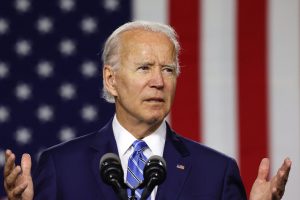

The dollar was largely higher Tuesday as Joe Biden confirmed his bid to run for re-election as US president next year.
The rand weakened more than one percent against the stronger dollar, and was trading at R18.37/$ on Tuesday evening.
The Biden announcement comes with the US economy still battered by high inflation and interest-rate rises, triggering concerns of a possible recession.

US President, Joe Bidden
Worries that the global economy could enter a downturn this year continued to weigh heavily on stock markets Tuesday.
“Equity markets are slightly under pressure on Tuesday following a wide array of earnings releases and as investors eye further US data later in the week,” said Craig Erlam, senior market analyst at OANDA trading platform.
Wall Street fell, with the Dow shedding 0.4 percent and the tech-heavy Nasdaq dropping 1.0 percent ahead of a flurry of tech firm results.
Investors were also put off by an earnings miss and downbeat outlook for the rest of the year by UPS, which along with its rival parcel shipping companies are seen as a bellwether for the overall economy.
“UPS’ forecast of a weaker economy is just the kind of warning investors don’t want to hear, and has likely prompted a round of selling on renewed recession fears,” said Chris Beauchamp, chief market analyst at online trading platform IG.
Shares of regional bank First Republic (FRC) fell 28 percent after it reported a 40 drop in deposits, adding to worries about mid-size lenders in the US after three banks collapsed last month.
In Europe, Frankfurt stocks edged higher, while London and Paris fell.
Following recent shocks in the banking sector, UBS on Tuesday posted an underwhelming first quarter net profit of $1.0 billion but insisted it had seen strong client inflows as it prepared to integrate its stricken rival Credit Suisse.
Shares in UBS, Switzerland’s biggest bank, fell around four percent in early trading following the announcement, but clawed back to close down around 2.2 percent.
Asian markets ended mostly lower, with Hong Kong falling sharply on the back of major losses in Chinese firms, as a lack of clear direction ahead of key announcements this week presented a challenge for global investors.
It was the third straight day of losses on the Hang Seng Index, with Alibaba Group Holdings down more than three percent, internet giant Baidu down nearly four and pharmaceutical maker Wuxi Biologics dropping almost seven.
“Investors seem to be having concerns about the sustainability of the recovery in China and the heightening of geopolitical tensions,” Redmond Wong, of Saxo Capital Markets HK, told Bloomberg.
Traders have largely been treading water ahead of earnings results from US tech behemoths such as Amazon, Microsoft, Facebook owner Meta and Google parent Alphabet.
Alphabet and Microsoft report after the close of US trading.
Stephen Innes of SPI Asset Management said in a note that despite “a reasonably constructive picture on the economy front”, it was tough to get “a clean read on anything happening this week”.
“One of the most challenging things about navigating this bear market and the widely anticipated coming recession is that we’ve had to differentiate between real and nominal economic and market variables like nothing in recent decades,” he said.
Recession worries weighed on oil prices, which fell over two percent.
“This leaves them clinging on to only a slight gain from the news of the OPEC production cut, and seems to suggest that traders are back to selling oil on concerns about the global economy,” said IG’s Beauchamp. – news24.com
Additional reporting by News24